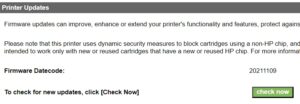Our research team has recently come across a vulnerability affecting specific models of HP printers. This issue exposes the devices to the potential of remote code execution attacks. The primary cause is said to be a buffer overflow that occurs when rendering fonts embedded in PDF files.
A vulnerability such as remote code execution poses a significant risk to both the affected device and the broader network. When exploited, they allow attackers to execute arbitrary code on the affected device, often with the same privileges as the user or system, leading to severe consequences such as Denial of Service (DoS), and even full system compromise.

While the issue can be resolved by firmware updates from HP, printers are not set to automatically update by default, leaving some unwary customers open to this form of attack.
To help prevent such security vulnerabilities, HP recommends regularly updating firmware and applying security patches. Additionally, HP advises that any third-party security patches for systems running HP software products should be applied in line with the customer’s patch management policies to ensure consistent and secure operations.
Furthermore, potentially vulnerable devices should be deployed within a segmented network, and appropriate firewall and access control systems should be implemented. This helps limit exposure to threats and ensures that only authorized users and systems can access the devices, reducing the risk of exploitation.
Otonata specializes in providing cybersecurity solutions to protect professionals in their home or small network environment.
Reference: https://support.hp.com/us-en/document/ish_10174031-10174074-16/hpsbpi03917



